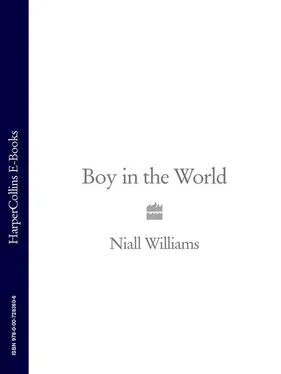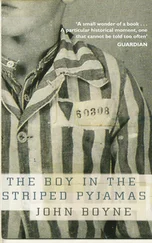‘What is it?’ asked the boy, not taking it.
‘Before your mother died, and you were only an infant, she wrote this letter to you. I watched her write it in the hospital. She wanted you to have it when you turned thirteen. But today she … today you …’ The Master looked to the ghosts but they were gone. ‘Well … the, em, the Confirmation is an important day. It seems right. Here.’
Suddenly the boy could not move. His heart was racing, his throat tight, had he already loosened the tie? Then why was it he could hardly breathe? Why was it the walls of the little kitchen seemed to pulse in and out?
Breath. In breath. Breathe .
He had to breathe.
Her letter. Breathe. This. In breath .
Don’t. Can’t .
No. No, he couldn’t. He would not take the letter. He would not reach out and take it. No, he couldn’t bear to, he silently decided.
The decision flashed in his mind like a wet knife in a dishcloth. He wouldn’t take the letter. He would wait. He would take it some other day. Then he gasped a breath at last, and the room seemed to stop pulsing.
No .
He looked down. And there in his hand he held the cream-coloured envelope.
TWO
The boy had never known his mother other than that her name was Marie and that she was the shyly smiling young woman with brown hair in the photograph on the piano. He knew that she died after fighting cancer until her hair was gone and her hands so weak they could not hold on to him. He had no idea who his father was, nor, it seemed, did anyone. And in fact for almost all of the boy’s life to that day he had not thought about it very much. His father and mother had been the Master and his wife when she was alive. They had adopted him as a baby and had loved him always.
But now he had the cream-coloured envelope in his hand. He was holding the envelope she had held, about to look at the page she had written.
‘It’s all right,’ said the Master. ‘You can read it now or you can keep it until later.’ He glanced towards the kitchen door and then the windows to see if the ghosts might be lingering somewhere, but there was nothing. ‘She is … well, she would have been so proud of you today. They both would have.’ He smiled with his eyes and a hundred wrinkled lines were written around them. ‘Whatever you’d like now,’ he said softly, seeing that the boy was lost and unsure. ‘Sometimes,’ he put his arm upon the boy’s shoulder, ‘sometimes the best thing to do is to do nothing for a while. Doing nothing at all is often the very wisest thing. Because, it was explained to me once, as the world is a ball and is turning and everything is in fact in motion all the time, doing nothing is not really doing nothing, it’s allowing things to move at their own pace.
‘Of course some people don’t understand the wisdom of this,’ the Master whispered, ‘they think when men are doing nothing they are doing nothing.’ Without the boy’s realizing it, the old man had led him to the kitchen door. ‘Take the envelope, go upstairs, do nothing. The church is in half an hour, plenty of time,’ said the Master, ‘go ahead.’
But the boy did not move. He looked down at the envelope in his hand. And suddenly, there opened a quake in his heart, a glaring gulf of sorrow – widening and widening – a dark nauseating chasm into which he himself was about to fall. He felt he was going to cry, but made only a small moan. Rushing up inside of him now rose a giant black wave of loss and sadness and a kind of anger at the world. The torrent roared in his ears. In it were carried the dead, the ghosts of the past he had thought buried. Before his eyes the room seemed to shimmer. The walls would give. The envelope was shaking in his hand as if electric. He could not bear it. He could not bear the hurt he would release if he opened the letter. He suddenly believed he would drown in grief. And so, perhaps even before he had made a decision, before his brain had considered its menu of options and chosen, and before there was time to stop him, he had stepped back inside the kitchen and thrown the cream-coloured envelope spinning into the fire.
‘I don’t want it,’ the boy said, his face flushed, his eyes bright.
And with that he quickly opened the door and left the kitchen and climbed the stairs two by two until he was inside his bedroom and had thrown himself headfirst on to the blankets.
In the place where he lived the boy had no friends. Perhaps because of his great intelligence, he had found himself living on the edge of things for his entire childhood. In the classroom many might elbow him and ask in whispers for the answer to questions in English or History or Geography, but once in the open spaces of the yard they quickly ignored him. Perhaps too it was because his skin was not as pale as the others, because there was something indefinable about him that seemed marked , the way a boy might feel with a splashed birthmark on his face or a scar that reminded all of peril and injury. Whichever the reason, the boy had long ago begun to feel that some part of him was flawed, did not work the way things should. He imagined sometimes there was within him a real but invisible damage. And it was this of which he was most afraid.
To escape the feeling that he had no friend to confide in, the boy had a journal. To its white pages he told his thoughts. Some days there was little to tell, others there was not space enough in the calendar day for all that was hurrying through his mind. As he got older his thoughts grew more complex. Things were not so clear any more. He couldn’t write down just one phrase to tell what had happened or what he thought about something. He wrote in fragments, half-questions. The boy did not name the journal, nor did he think of it in any way as a person. But by the time he was twelve years of age he could not have imagined living his life without it.
So, now, lying on his bed after throwing the cream-coloured envelope into the fire, he took out the most recent volume. It was green-covered and hard-backed and came from a supplier in Dublin the Master knew. It had a thin frayed golden ribbon that acted as a page marker. This the boy especially loved. He loved when the book was closed to see how it marked his progress, and to open the journal by taking the frayed end and pulling so the pages splayed open at exactly the right place, like an invitation.
Now the invitation was urgent. He pulled open the page quickly and took a green pen from the book-stacked locker beside his bed. He looked briefly at the words he had written the night before.
Cour-age
Faith-age
Believe-age
I believe in what?
Now on a new page he wrote:
I burnt the cream letter.
Crimletter Criminaletter
Why? Why?
There is no I in why.
There is no why.
Because knot.
Because I am knot.
Because A cause B cause
See cause I don’t want to know.
No know thatsall.
Endofstory.
The boy lifted his pen and snapped the journal shut. That was it. He was done. Though to someone else the few phrases he had written might have seemed barely anything, almost the moment he had finished writing them the boy felt better. He sat on his bed and could breathe more easily now. It was over and done with. In a few moments he heard the Master’s heavy step on the stairs, then the knock on his door.
‘Come in,’ the boy said.
The Master’s face was kind and full of concern, in his grey eyes something so forgiving and wise that the boy felt at once the comfort of him, like a flannel blanket.
‘All right?’ asked the Master.
‘Yes. Fine. Thanks.’
‘All right, just that it’s maybe time for us to go. And you know what Father Paul’s like. Want everything like clockwork. Be up since dawn with terror of the bishop coming.’
Читать дальше












